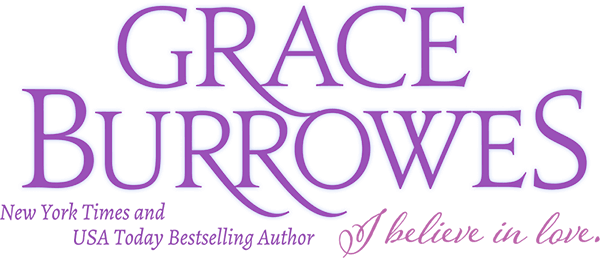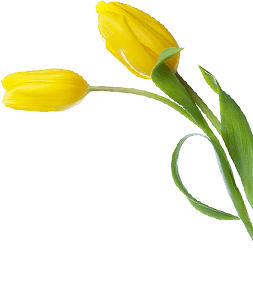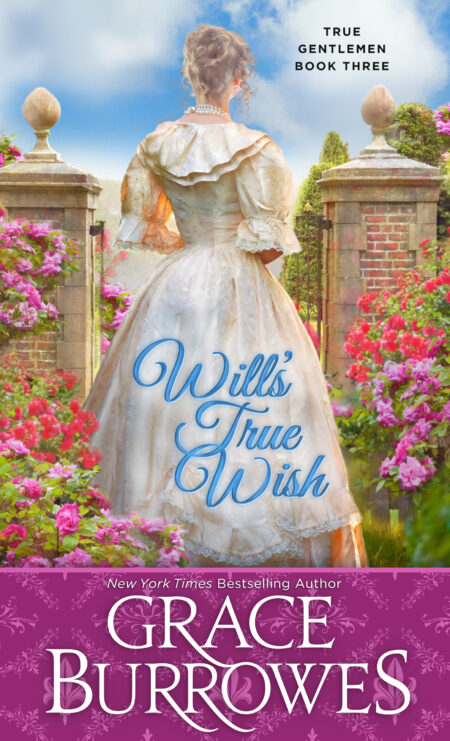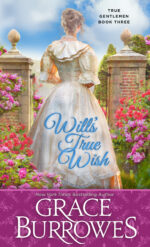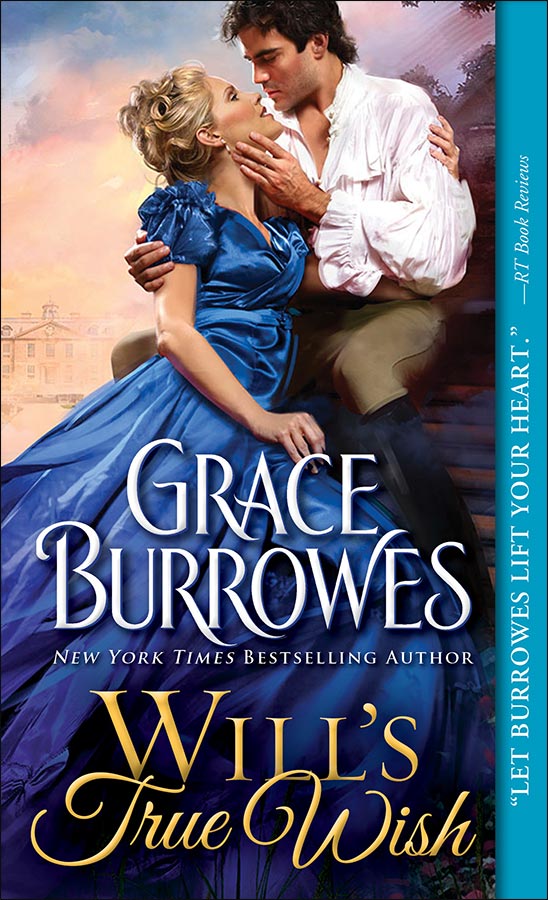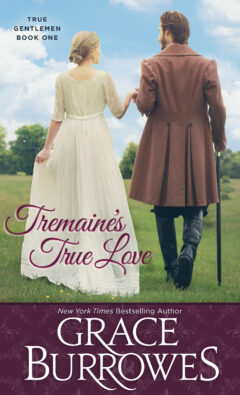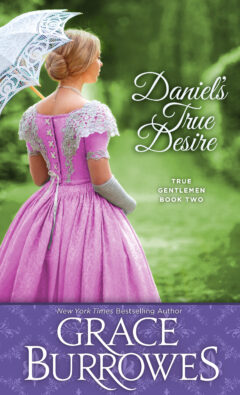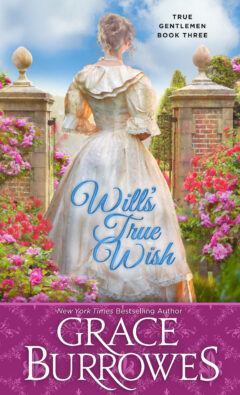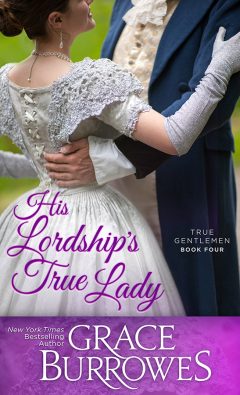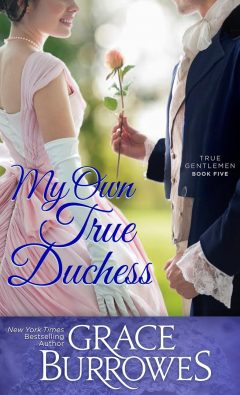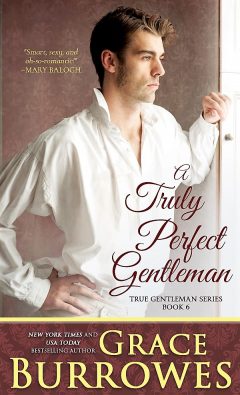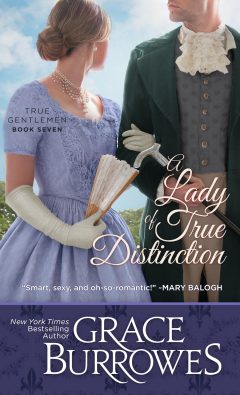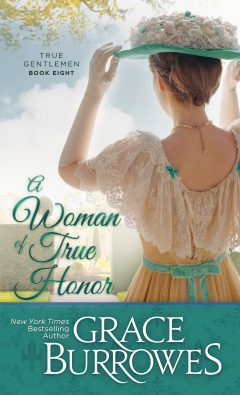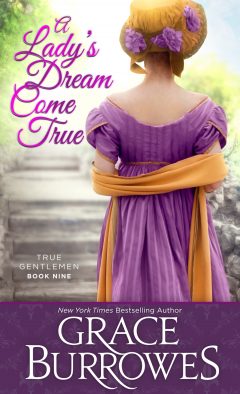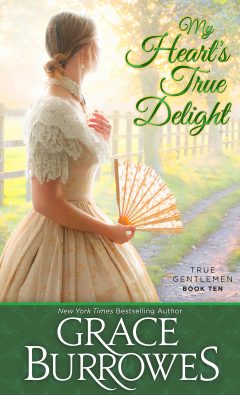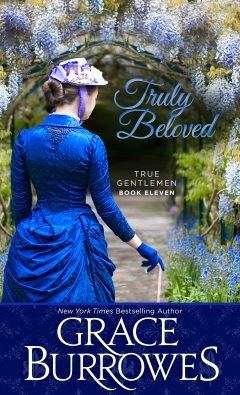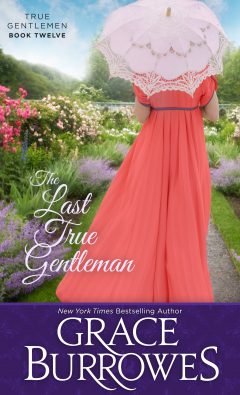Will’s True Wish
Book 3 in the True Gentlemen series
Will Dorning, as the Earl of Casriel’s heir, and older brother to four rambunctious brothers, sees his life as one of duty and drudgery. He guards the earl’s back, and keeps a watchful eye on his siblings, though his only real companions are the dogs he’s treasured since boyhood; Lady Susannah Haddonfield has no patience with loud, smelly beasts of any species, but must learn to appear to like dogs so as not to offend her sister’s only marital prospect. Susannah turns to Will, an acquaintance from the most awkward years of her adolescence, to teach her how to get along with canines. Will instead teaches her how to get along with him, and with her siblings, until Susannah must choose between her favorite lone wolf and placid propriety.
Enjoy An Excerpt







Chapter One
“We were having a perfectly well-behaved outing,” Cam said, though Cam Dorning and perfect behavior enjoyed only a distant acquaintance. “Just another pleasant stroll in the pleasant park on a pleasant spring morning, until George pissed on her ladyship’s parasol.”
The culprit sat in the middle of the room, silent and stoic, tail thumping gently against the carpet.
“Georgette did not insult Lady Susannah’s parasol all on her own initiative,” Will Dorning retorted, for he knew Lady Susannah Haddonfield was adept at avoiding all notice. “Somebody let her off the leash.”
“Lady Susannah wasn’t on a leash,” Cam shot back. “She was taking the air with her sister and Viscount Effington, and his lordship was carrying the lady’s parasol—being gallant, or eccentric. I swear Georgette was sniffing the bushes one moment and aiming for Effington’s knee the next. Nearly got him, too, which is probably what the man deserves for carrying a parasol in public.”
Across the earl’s study, Ash dissolved into whoops that became pantomimes of a dog raising her leg on various articles of furniture in the earl of Casriel’s London abode. Cam had to retaliate by shoving at his older brother, which of course necessitated reciprocal shoving from Ash, which caused the dog to whine fretfully.
“I should let Georgette use the pair of you as a canine convenience,” Will muttered, stroking a hand over her silky, brindle head. She was big, even for a mastiff, and prone to lifting her leg in the fashion of a male dog when annoyed or worried.
“I thought I’d let her gambol about a bit,” Cam said. “There I was, a devoted brother trying to be considerate of your dog, when the smallest mishap occurs, and you scowl at me as if I farted during grace.”
“You do fart during grace,” Ash observed. “During breakfast too. You’re a farting prodigy, Sycamore Dorning. Wellington could have used you at Waterloo, His Majesty’s one-man foul miasma, and the French would still be—”
“Enough,” Will muttered. Georgette’s tail went still, for the quieter Will became, the harder he was struggling not to kill his younger brothers, and Georgette was a perceptive creature. “Where is the parasol?”
“Left it in the mews,” Cam said. “A trifle damp and odiferous, if you know what I mean.”
“Stinking, like you,” Ash said, sashaying around the study with one hand on his hip and the other pinching his nose. “Perhaps we ought to get you a pretty parasol to distract from your many unfortunate shortcomings.”
Casriel would be back from his meeting with the solicitors by supper, and the last thing the earl needed was aggravation from the lower primates masquerading as his younger siblings.
More aggravation, for they’d been blighting the family escutcheon and the family exchequer since birth, the lot of them.
“Sycamore you have two hours to draft a note of apology to the lady,” Will said. “I will review your epistle before you seal it. No blots, no crossing out, no misspellings.”
“An apology!” Cam sputtered, seating himself on the earl’s desk. “I’m to apologize on behalf of your dog?! I didn’t piss on anybody.”
At seventeen years of age, Cam will still growing into his height, still a collection of long limbs and restless movement that hadn’t resolved itself into manly grace. He had the Dorning dark hair, and the infamous Dorning gentian eyes, though.
Also the Dorning penchant for mischief. Will snatched the leash from Cam’s hand, and smacked Cam with it once, gently, for violence upset Georgette and was repellent to Will’s instincts as a trainer of dumb beasts.
“Neither of you will take Georgette to the park until further notice,” Will said. “If you want to attract the interest of the ladies at the fashionable hour, I suggest you either polish your limited stores of charm or take in a stray puppy.”
“A puppy?” Cam asked, opening a drawer into which he had no business poking his nose. “Puppies are very dear.”
Nature had intended that puppies of any species be very dear, for they were an endless lot of bother. Ash, having attained his majority, occasionally impersonated a responsible adult. He ceased his dramatics and perched beside Cam on the desk.
“Shall you apologize to Lady Shakespeare or to Effington’s knees?” Ash asked. “At length, or go for the pithy, sincere approach? Headmaster says no blots, no crossing out, no misspellings. I’m happy to write this apology on your behalf for a sum certain.”
Ash had an instinct for business—he had read law—but he lacked the cunning Cam had in abundance.
“Ash makes you a generous offer, Cam,” Will said, stowing the leash on the mantel and enduring Georgette’s But-I’ll-Die-If-We-Remain-Indoors look. “Alas, for your finances, Ash, you’ll be too busy procuring an exact replica of the lady’s abused accessory, from your own funds.”
“My own funds?”
Ash hadn’t any funds to speak of. What little money Casriel could spare his younger siblings, they spent on drink and other Town vices.
“An exact replica,” Will said. “Not a cheap imitation. I will inspect your purchase to be complete by the time Cam has drafted an apology. Away with you both, for I must change into clothing suitable for a call upon an earl’s daughter.”
Into Town attire, a silly, frilly, extravagance that on a man of Will’s proportions was a significant waste of fabric. He was a frustrated sheep farmer, not some dandy on the stroll, though he was also, for the present, the Earl of Casriel’s heir.
So into his finery, he would go.
And upon Lady Susannah Haddonfield, of all ladies, he would call.
![]()
“A big, well-dressed fellow is sauntering up our walk,” Lady Della Haddonfield announced. “He’s carrying a lovely purple parasol. The dog looks familiar.”
Though dogs occasionally accompanied their owners on social calls, men did not typically carry parasols, so Lady Susannah Haddonfield joined Della at the window.
“That’s the mastiff we met in the park,” Susannah said. “The Dorning boys were with her.” A trio of puppies, really, though the Dorning fellows were growing into the good looks for which the family was famous.
“Effington said that mastiff was the largest dog he’d ever seen,” Della replied, nudging the drapery aside. “The viscount does adore his canines. Who can that man be? He’s taller than the two we met in the park.”
Taller and more conservatively dressed. “The earl, possibly,” Susannah said, picking up her volume of Shakespeare’s sonnets and resuming her seat. “He and Nicholas are doubtless acquainted. Please don’t stand in my light, Della.”
Della, being a younger sister, only peered more closely over Susannah’s shoulder. “You’re pouring over the sonnets again. Don’t you have them all memorized by now?”
The genteel murmur of the butler admitting a visitor drifted up the stairs, along with a curious clicking sound, and then…
“That was a woof,” Susannah said. “From inside this house.”
“She seemed a friendly enough dog,” Della replied, taking a seat on the sofa. Della was the Haddonfield changeling, small and dark compared to her tall, blond siblings, and she made a pretty picture on the red velvet sofa, her green skirts arranged about her.
“She’s an ill-mannered canine,” Susannah said, “if my parasol’s fate is any indication.” Though the dog was a fair judge of character. Lord Effington fawned over all dogs and occasionally over Della, but Susannah found him tedious. The Dorning’s mastiff had lifted her leg upon Lord Effington’s knee, and Susannah’s parasol had been sacrificed in defense of his lordship’s tailoring.
Barrisford tapped on the open door. One never heard Barrisford coming or going, and he seemed to be everywhere in the household at once.
“My ladies, a gentleman has come to call and claims acquaintance with the family.”
The butler passed Susannah a card, plain black ink on cream stock, though Della snatched it away before Susannah could read the print.
“Shall I say you ladyships are not at home?” Barrisford asked.
“We’re at home,” Della said, just as Susannah murmured, “That will suit, Barrisford.” She was coming up on the seventy-third sonnet, her favorite.
“We can receive him together,” Della said. “If Nicholas knows the earl of Casriel, he very likely knows the spares, and Effington fancied that dog most rapturously.”
“Effington fancies all dogs,” Susannah said, and he fancied himself most of all. “But you’ll give me no peace if I turn our caller away. Show him up, Barrisford, and send along the requisite tray.”
“I’ve never drunk so much tea in all my life as I have this spring,” Della said. “No wonder people waltz until all hours and stay up half the night gossiping.”
Gossiping, when they might instead be reading. Was any trial on earth more tedious than a London Season?
“Mr. Will Dorning, and Georgette,” Barrisford said a moment later. He stepped aside from the parlor door to reveal a large gentleman and an equally outsized dog. Susannah hadn’t taken much note of the dog in the park, for she’d been too busy trying not to laugh at Effington. The viscount prided himself on his love of canines, though he was apparently fonder of his riding breeches, for he’d smacked the dog more than once with Susannah’s abused parasol.
Barrisford’s introduction registered only as the visitor bowed to Susannah.
Will Dorning, not the Earl of Casriel, not one of the younger brothers. Willow Grove Dorning himself. Susannah had both looked for and avoided him for years.
“My Lady Susannah, good day,” he said. “A pleasure to see you again. Won’t you introduce me to your sister?”
Barrisford melted away, while Della rose from the sofa on a rustle of velvet skirts. “Please do introduce us, Suze.”
Della’s expression said she’d introduce herself if Susannah failed to oblige. The dog had more decorum than Della, at least for the moment.
“Lady Delilah Haddonfield,” Susannah began, “may I make known to you Mr. Will Dorning, late of Dorset?” Susannah was not about to make introductions for the mastiff. “Mr. Dorning, my sister, Lady Delilah, though she prefers Lady Della.”
“My lady.” Mr. Dorning bowed correctly over Della’s hand, while the dog sat panting at his feet. Like most men, he’d probably be smitten with Della before he took a seat beside her on the sofa. Only Effington’s interest had survived the rumors of Della’s modest settlements, however.
“Your dog wants something, Mr. Dorning,” Susannah said, retreating to her seat by the window.
Mr. Dorning peered at his beast, who was gazing at Della and holding up a large paw.
“Oh, she wants to shake,” Della said, taking that paw in her hand and shaking gently. “Good doggie, Georgette. Very pleased to make your acquaintance.”
“Georgette, behave,” Mr. Dorning muttered, before Susannah was faced with the riddle of whether manners required her to shake the dog’s paw.
Georgette turned an innocent expression on her owner, crossed the room, and took a seat at Susannah’s knee.
Presuming beast, though Georgette at least didn’t stink of dog. Effington’s endless canine adornments were the smelliest little creatures.
“My ladies, I’m here to apologize,” Mr. Dorning said. “Georgette was in want of manners earlier today. We’ve come to make restitution for her bad behavior and pass along my brother Sycamore’s note or apology.”
“Do have a seat, Mr. Dorning,” Della said, accepting a sealed missive from their guest. “At least you haven’t come to blather on about the weather or to compliment our bonnets.”
Bless Della and her gift for small talk, because Susannah was having difficulty thinking.
This was not the version of Will Dorning she’d endured dances with in her adolescence. He’d filled out and settled down, like a horse rising seven. Where a handsome colt had been, a war horse had emerged. Mr. Dorning’s boots gleamed, the lace of his cravat fell in soft, tasteful abundance from his throat. His clothing fit him, in the sense of being appropriate to his demeanor, accentuating abundant height, muscle, and self-possession.
Even as the man sat on the delicate red velvet sofa, a frilly purple parasol across his knees.
“This is for you, my lady,” he said, passing Susannah that parasol. “We didn’t get the color exactly right, but I hope this will suffice on short notice to replace the article that came to grief in the park.”
Susannah’s parasol had been blue, a stupid confection that had done little to shield a lady’s complexion. That parasol hadn’t made a very effective bludgeon when turned on the dog.
“The color is lovely,” Susannah said, “and the design very similar to the one I carried earlier.”
Susannah made the mistake of looking up at that moment, of gazing fully into eyes of such an unusual color, poetry had been written about them. Mr. Dorning’s eyes were the purest form of the Dorning heritage, nearly the color of the parasol Susannah accepted from his gloved hands.
Willow Dorning’s eyes were not pretty, though. His eyes were the hue of a sunset that had given up the battle with night, such that angry reds and passionate oranges had faded to indigo memories and violet dreams. Seven years ago, his violet eyes had been merely different, part of the Dorning legacy, and he’d been another tall fellow forced to bear his friend’s sisters company. In those seven years, his voice had acquired night-sky depths, his grace was now bounded with self-possession.
Though he still apparently loved dogs.
“My thanks for the parasol,” Susannah said, though she might be repeating herself. “You really need not have bothered. Ah, and here’s the tea tray. Della, will you pour?”
Della was effortlessly social. Not the reserved paragon their old sister Nita was, and not as politically astute as their sister Kirsten. Both of those ladies yet bided in Kent, either recently married or anticipating that happy state.
Leaving Susannah unmarried and abandoned as the Season gathered momentum.
Exactly as she’d felt seven years ago.
“Georgette likes you, Susannah,” Della said, as she poured the tea. “Or she likes that parasol.”
The dog had not moved from Susannah’s knee, though she was ignoring the parasol and sniffing at the sonnets on the side table.
“Georgette is shy,” Mr. Dorning said, “and she’s usually well mannered, save for occasionally snacking on an old book. Her mischief in the park was an aberration, I assure you. Lady Della, are you enjoying your first London Season?”
For the requisite fifteen minutes, Della and Mr. Dorning made idle talk, while Susannah discreetly nudged the sonnets away from the dog, sipped tea and felt agreeably ancient. Without Nita or Kirsten on hand, Susannah had become the older sister suited to serving as a chaperone at a social call.
And upon reflection, she didn’t feel abandoned by her older sisters. She was simply taking her turn as the spinster in training before becoming a spinster in earnest.
Thank God.
“I’ll bid you ladies good day,” Mr. Dorning said, rising.
“I’ll see you out,” Susannah replied, because that was her role, as quasi-chaperone, and having Barrisford tend to that task would have been marginally unfriendly. Mr. Dorning, as the son of an earl, was her social equal, after all.
“Georgette, come.” Mr. Dorning did not snap his fingers, though Effington, the only other dog lover in Susannah’s acquaintance, snapped his fingers constantly—at dogs and at servants. He’d snapped his fingers at Della once, and Susannah had treated Effington to a glower worthy of her late papa in a taking.
Georgette padded over to her master’s side, and Susannah quit the parlor with them, leaving Della to attack the biscuits remaining on the tea tray.
“You didn’t use to like dogs,” Mr. Dorning observed.
“I still don’t like dogs,” Susannah replied, though she didn’t dislike them. Neither did she like cats, birds, silly bonnets, London Seasons, or most people. Horses were at least useful, and sisters could be very dear. Brothers fell somewhere between horses and sisters.
“Georgette begs to differ,” Mr. Dorning said as they reached the bottom of the steps. “Or perhaps she was making amends for her trespasses against your parasol by allowing you to pat her for fifteen straight minutes.”
Susannah took Mr.Dorning’s top hat from the sideboard and passed it to him. “Georgette ignored the new parasol. I think my wardrobe is safe from her lapses in manners, though the day your dog snacks on one of my books will be a sorry day for Georgette, Mr. Dorning.”
Despite Susannah’s her stern words, she and Mr. Dorning were managing, getting through the awkwardness of being more or less alone together.
“You’re still fond of Shakespeare?” Mr. Dorning asked as he tapped his hat onto his head.
A glancing reference to the past, also to the present. “Of all good literature. You’re still waiting for your brother to produce an heir?”
Another reference to their past, for Mr. Dorning had confided this much to Susannah during one of their interminable turns about Lady March’s parlor. Until the earl of Casriel had an heir in the nursery, Will Dorning’s self-appointed lot in life was to be his brother’s second-in-command.
Susannah’s brothers hadn’t been half so loyal to Nicholas, for all they loved him dearly.
“Casriel is as yet unmarried,” Mr. Dorning said, “and now my younger brothers strain at the leash to conquer London.”
He exchanged his social gloves for riding gloves, giving Susannah a glimpse of masculine hands. Those hands could be kind, she hadn’t forgotten that. They’d also apparently learned how to give the dog silent commands, for at Mr. Dorning’s gesture, Georgette seated herself near the front door.
“I’m much absorbed keeping Cam and Ash out of trouble,” he went on, “while allowing them the latitude to learn self-restraint. Apparently I must add my loyal hound to the list of parties in need of supervision.”
The dog thumped hers tail.
Did Will Dorning allow himself any latitude? Any unrestrained moments? He’d been a serious young man. He was formidable now.
“We’ll doubtless cross paths with your brothers, then,” Susannah said, “for Della is also determined to storm the social citadels.” Once Della was safely wed, Susannah could luxuriate in literary projects, a consummation devoutly to be wished, indeed.
“You have ever had the most intriguing smile,” Mr. Dorning observed, apropos of nothing Susannah could divine. “Thank you for accepting my apology, my lady. I look forward to renewing our acquaintance further under happier circumstances.”
Having dispensed such effusions as the situation required, he bowed over Susannah’s hand, and was out the door, his dog trotting at his heels.
An intriguing smile? Susannah regarded herself in the mirror over the sideboard. Her reflection was tall, blond, blue-eyed, as unremarkable as an earl’s daughter could be amid London’s spring crop of beauties. She was smiling, though…
And her hands smelled faintly of Georgette. Perhaps she had stroked the dog’s silky ears a time or two. Or three.
“Though I don’t even like dogs.”
![]()
“Our younger brothers are in awe of you,” Grey Dorning, Earl of Casriel said, as Will’s mare was led out. “Over their morning ale, they ridicule me, a belted earl with the entire consequence of the house of Dorning upon my broad and handsome shoulders. You, they adore for strolling down Park Lane swinging a purple parasol as if it’s the latest fashion edict from Almack’s.”
Rather than reply immediately, Will took a moment to greet his bay mare. He held a gloved hand beneath her nose, pet her neck, and before Casriel’s eyes, the horse fell in love with her owner all over again.
“I took Georgette calling with me,” Will said, scratching at the mare’s shoulder. “She can be both charming and menacing, which is why Cam and Ash like to take her to the park. She impresses the fellows and attracts the ladies, rather like you’re supposed to do.”
The stable lad led out Casriel’s gelding, a handsome black specimen whose displays of affection were reserved for his oats. The groom gave the horse a pat on the quarters and the horse wrung its tail.
“Don’t scold me, Willow,” Casriel said, climbing into the saddle. “The Season is barely under way, and an earl must tend to business. The impressing and attracting can wait a few more days.”
“Your only prayer of avoiding matrimony evaporated when Jacaranda married Worth Kettering,” Will said, taking a moment to check the fit of the bridle and girth before mounting. “. Without a sister to serve as hostess, you are doomed to wedlock, Casriel. Marry for the sake of your household, if not for your lonely heart. Dorning House needs a woman’s touch if the staff isn’t to continuing revolting twice a quarter.”
“You are such a romantic, Willow,” Casriel replied, as their horses clip-clopped down the alley. “I can barely afford to educate our brothers and that rebellious household must eat. I will marry prudently or not at all. How did the visit to the Haddonfield ladies go?”
That question ought to deflect Will from sermonizing on the need for every unmarried earl to take a wife posthaste, though like many questions put to Will, it met with a silent reception.
They reached the street, where the surrounding traffic meant Will would remain civil, despite an older brother’s well meant goading, so Casriel tried again.
“Did Lady Susannah receive you? She has an entire litter of siblings, doesn’t she?” Casriel did too, but lately he felt like a stranger to even his only full brother.
“Lady Susannah was most gracious,” Will replied, “as was Lady Della. Lady Della has the misfortune to be the only petite, dark-haired Haddonfield in living memory.”
“A runt, then, in your parlance. If she’s a pretty, well dowered runt, nobody will bother much about her shortcomings.” Will was partial to runts, perhaps he’d marry the Haddonfield girl.
“Our own runt has taken to gambling,” Will said. “Though if Cam keeps growing, he might soon consider a career as a prizefighter.”
Sycamore, for shame. “All young men attend cockfights.”
“No, Grey, they do not. Duchess of Moreland coming this way.”
Casriel tipped his hat, the Duchess waved. Her Grace—a pretty, older lady with a gracious smile—probably knew Casriel’s antecedents back for six generations, but without Will’s warning, Casriel would have been hard put to recall he’d seen the woman at the previous evening’s musicale.
Financial anxiety played havoc with any man’s concentration. No wonder Papa had retreated to the conservatory and the glass house rather than take the earldom in hand.
“How do you keep it all organized, Will?” Casriel asked. “How do you keep track of Cam’s mischief, the duchesses, the purple parasols, the stewards?” Will didn’t run the earldom, but he made it possible for Casriel to run it and still be head of the family.
“A purple parasol is rather difficult to lose track of,” Will replied, possibly teasing. One could never tell for sure when Will was being deep and when he was being ironic as hell.
“Am I to worry about Sycamore’s gambling?” Casriel would worry of course, about the sums lost, and about Sycamore, who well knew the family had no coin to spare.
“Yes, you should worry,” Will replied, “though not about the money. I’ve bought Cam’s vowels, and will deduct a sum from his allowance from now until Domesday. You should worry because he was at a bear baiting, because Ash could not stop him, because last week it was the cock fights. The company to be had in such locations is abysmal.”
Cam should be at university in other words. All young men in the awkward throes of late adolescence should be at university, though finding tuition for such an undertaking was three years of a challenge when more younger brothers were busily inspiring insurrection among the maids back in Dorset.
“What does Ash say?” Casriel asked.
“That he can’t control Cam, so he simply keeps an eye on him. This is how young men become spoiled or worse. My Lady Heathgate, her sister-in-law Lady Fairly beside her, with the matched chestnuts.”
“Wasn’t there some scandal involving Lady Fairly?” Casriel asked when his hat had been dutifully tipped.
“She was a vicar’s daughter taken advantage of by a scoundrel,” Will said in the same tones he’d report on a play seen the previous evening. “She managed Fairly’s brothel, though she never entertained clients, and he’s since divested himself of that business. The titled ladies in the family treat her as respectable, though she and Fairly live very quietly.”
“Willow, no wonder the boys are in awe of you. Thank God our papa forbade me to buy any commissions, or Wellington would have turned you into an intelligence officer and shortened the war considerably.”
Will drew back, allowing Casriel to ride first through a gap between a stopped curricle and the walk way.
“I would never have managed in the military,” Will said. “Bad enough they kill boys who’ve barely learned to shave, but they also kill horses by the thousands.”
This was the problem with Cam’s bad behavior. Not that the youngest Dorning brother was wasting money, for an earl’s younger son was bred to waste money, and not that he was making friends in low places.
Earl’s sons did that, too.
From Casriel’s perspective, the problem was that Cam sought entertainments involving harm to animals. Bloodsport was supposed to be part of a young gentleman’s diversions, true, but Will had no patience for entertainment based on inflicting misery on animals.
Cam had known that from the cradle.
Will did not have friends, though he knew everybody and was well liked. He had his brothers and his dogs. Casriel could not have said which Will would choose to save, if the choice were forced upon him.
“I can send Cam back to Dorset,” Casriel said, “but we’re better off keeping him where we can supervise him.” Where Will could supervise him.
“He might be trying to get sent back to Dorset,” Will replied, as the green oasis of Hyde Park came into view. “One of the Dorset housemaids had her eye on our youngest brother, and has had her hands on him too.”
“Angels deliver me,” Casriel muttered. “We don’t dare leave him in Dorset without one of us to watch over him, and yet I’m not about to turn off a house maid simply because Cam can be lured into the butler’s pantry.”
“Younger siblings grow up more quickly than heirs and spares,” Will said. “I’ll think of something.” He tipped his hat to a flower girl and tossed her a coin.
The girl was pudgy, plain, and her apron streaked with damp and dirt, but her smile was radiant as she passed Will a bouquet of violets.
“Thank you, Ellen,” Will said, bringing his mare to a halt. “Can you spare a posy for his lordship, too? He must make himself agreeable to the ladies who are thronging the park.”
The flower girl shot Casriel a dubious look, then selected a nosegay of lily of the valley. She handed the flowers to Will, who passed them over.
“Excellent choice,” Will said. “Good day to you, Ellen.”
The mare walked on, while Casriel dealt with holding a batch of delicate blossoms in addition to four reins.
“What am I to do with these, Willow? Carry them between my teeth? Why does that flower girl look familiar?”
“I’ve hired her to supply flowers for the house. She rarely speaks because of a stammer, but she’s quite bright, and has the best prices. An earl’s home must be maintained according to certain standards, which of course, a countess would see to.”
Oh, of course. The fate of the earldom rested on flowers Casriel probably could not afford, but stammering street vendors would have a fine Christmas. Whatever was amiss with Will, it was getting worse.
The closer they drew to the park, the more crowded the streets became, so the horses could move only at the walk. Willow deftly braided his batch of violets into the mare’s mane, where they somehow did not look ridiculous. Casriel, by contrast, felt the veriest fool riding through Mayfair, flowers in hand, and horse likely to turn up mischievous at any moment.
“The Duchess of Moreland’s two nieces,” Will said, quietly. “Miss Bethan and Miss Megan Windham. Their cousin, Lady Deane, the Duchess’s youngest daughter, at the ribbons.”
“How in God’s name do you keep them all straight?”
“Flowers to the elder,” Will murmured. “Miss Bethan, sitting on the outside.”
Miss Bethan Windham was a lovely little creature with whom Casriel had not danced. He would have recalled that red hair, and those green eyes, and the smile that blossomed when he passed her the flowers. The ladies flirted and teased and generally made a man forget which direction the park lay in, and then traffic shifted, and Will cleared his throat.
“Ladies, good day,” Casriel said, for he was as well trained to Will’s cues as any hound. “My regards to your family.”
“You can be charming,” Will said when the carriage had pulled away. “Don’t pretend you can’t. Those flowers will end up pressed between the pages of the lady’s journal, and the scent of lily of the valley will always make her think of you.”
“Is that how it works?” Will seemed very convinced of his theory, and yet to the best of Casriel’s knowledge, Will had never fancied a specific lady. “How is it, Willow, you know the names of all the women, right down to the flower girl? You earn the undying loyalty of horses and dogs, both, and impress our brothers daily, but the females never seem to notice you?”
Willow had the knack of becoming invisible, in other words. Of disappearing without going anywhere, just another tree in the hedgerow on a still spring day. He’d had this ability since boyhood, had slipped through university on the strength of it, and still used his invisibility to good advantage in ballrooms and gentlemen’s clubs.
“My objective is to ensure the ladies notice you,” Will said. “One of them might even notice Ash, who is a good looking, friendly devil, and knows his way around figures. Once I get you two married off, I can enlist your wives to assist me in finding ladies for our other brothers.”
Papa had despaired of Willow, though the late earl and his second son had had much in common.
“As usual, Will, you have an excellent plan, though I detect a serious flaw in your scheme.”
They crossed Park Avenue at a brisk trot, and not until they were well within Hyde Park did Will take the bait.
“What is the flaw in my plan?” he asked. “You and Ash are both handsome and sons of an earl. I see to it that you’re well dressed when it matters. You’re passable dancers and considerate of women. With all the bankers’ daughters looking to marry into the nobility, all of the viscounts and baron’s daughters or even widows—what?”
Willow had doubtless made lists of these women, another worry added to Casriel’s endless supply.
“I know you mean well, Will, but Ash and I can find our own ladies. The flaw in your plan is that you’ve made no provision for finding a lady of your own. Give me those violets. This park has become overrun with women, and an earl-without-countess must defend himself with whatever weapons he can find.”
“The park is always overrun with women at the fashionable hour,” Will said, “but as it happens, I have my own use for these flowers.”
Will cantered off in the direction of a gig driven by a blond woman with a petite brunette at her side. The Haddonfield ladies?
Casriel trotted after, for this moment would go down in Dorning history as the first encounter with a proper woman to which Willow Grove Dorning would arrive bearing flowers.
Chapter Two
“Delilah Haddonfield, if you don’t stop twirling my parasol,” Susannah said, “I will use it to smack you. You’ll scare some gallant’s horse, and he’ll be ridiculed, and then talk will start that you like men to notice you.”
The parasol slowed. “I am in my first Season, Suze. I am a legitimate by-blow, and my name is Delilah. If I encourage the notice of the men, I’m fast. If I don’t encourage the notice of the men, I put on airs. As it happens, I am trying to attract the notice of somebody.”
Effington often rode in the park at the fashionable hour, else Susannah would never have subjected herself to two outings in a single day. After the morning’s debacle, Delilah was doubtless nervous of his lordship’s regard.
“It’s early in the Season,” Susannah said, maneuvering around a stopped phaeton. “You needn’t attract anybody’s notice. Simply enjoy a pleasant outing in the company of your devoted sibling.”
“I love that about you,” Della said. “Behind your spectacles and sonnets, you’re tenacious and loyal.”
When Susannah wanted to slap her hand over Della’s mouth, she instead nodded cordially to the Duke of Quimbey, a jovial older fellow who could still gracefully turn a lady down the ballroom.
“You will please not mention my spectacles.” Spectacles were for the elderly, for clerks, and men of business. For people who had trouble reading, not women who devoured literature by the hour.
“Mr. Dorning,” Della said, snapping the parasol closed and resting it against the bench. “A pleasure to see you again. What a lovely mare.”
Susannah didn’t intend to draw the carriage to the verge, but to the verge the horse did go, and there halt. Perhaps their gelding needed a rest, or had an overly developed sense of the social niceties.
“My ladies,” Mr. Willow Dorning said, touching his hat brim. “I’m happy to see the new parasol put to use. I will refrain, however, from commenting on either bonnets or weather.”
Della’s brows drew down at Mr. Dorning’s grave tone, but Susannah understood teasing when she heard it.
“See that you don’t, sir,” she said. “Has your dog been denied the privileges of the park for her earlier indiscretions?”
Susannah noticed Georgette’s absence, for the mastiff was a part of Will Dorning’s ensemble, like a carved walking stick or a particular signet ring, only larger and more noticeable. Susannah wasn’t sure what the violets in Mr. Dorning’s hand were about, though for the past seven years, violets had reminded her of his eyes.
And of his gallantry.
“Willow, you are remiss,” said a fellow trotting up on Will’s left. The newcomer rode a handsome black horse, had the Dorning violet eyes, and felt entitled to an introduction.
The earl, then. Susannah hadn’t seen him for years. Beside her, Della preened, fluffing her skirts and twiddling her bonnet ribbons, exactly as a young lady might.
Exactly as Susannah never had.
“My ladies, this presuming lout is my brother,” Will said. “Grey, Earl of Interruption and Casriel. Apparently, we’re about to be joined by my younger brothers as well, for which I do apologize.”
The last was aimed at Susannah, more drivel, but Mr. Dorning’s eyes said he was also commiserating with her on the entire topic of siblings. More introductions followed, for Mr. Ash Dorning, and Mr. Sycamore—“though he will ignore you unless you call him Cam”—Dorning.
The earl seemed content to sit back and allow his younger brother to manage the entire encounter. Other carriages tooled past, other gentlemen rode by, and for the first time, Lady Della Haddonfield was seen to hold court in the park.
Della teased Ash Dorning about the fancy knot in his cravat, while Susannah tried not to stare at Mr. Willow Dorning’s violets.
“Thank you,” Susannah said, beneath the banter of their siblings. Will Dorning was the most perceptive man Susannah knew, for all he lacked charm. She needn’t say more.
“You’re welcome,” he replied just as softly. “I have my own motives, though.”
Something Della said caused the other three brothers to laugh, and up and down the carriage parade, heads turned. The Earl of Casriel smiled at Lady Della Haddonfield, ensuring the moment would be remarked the women over tea and by the gentlemen over cards.
“We each have our own motives,” Susannah replied. Shakespeare had made the same point in a hundred more eloquent turns of phrase.
Mr. Dorning fiddled with his horse’s mane. “It hasn’t grown easier, then? You haven’t learned to love the dancing and flirting and being seen?”
He’d predicted she would. He’d been wrong, or kind, or both.
“I am content,” Susannah said, which they both knew for a lie. She had never needed to dissemble with him, so she amended her statement. “I will be content, rather. Della has already attached the interest of Viscount Effington, and that portends a successful Season for her.”
This merry, impromptu gathering in the park surrounded by four handsome fellows improved those odds considerably.
“May we call upon you, Lady Susannah? You and Lady Della?”
The question hurt. A childish lament—I saw him first—crowded hard against loyalty to Della. Willow Dorning had been honorable toward Susannah before she’d comprehended how precious such regard was.
He’d make a wonderful brother-in-law, damn him.
She smiled brilliantly. “Of course you must call up on us, you and however many brothers or dogs you please. We’re always happy to welcome our friends.” A slight untruth, for Susannah resented any who interrupted her reading.
“Willow!” the earl called. “Didn’t you bring those posies for the lady?”
Della Haddonfield, who could wield truth like a rapier, and silence like a shield, simpered, and Susannah’s heart broke a little.
A nuisance, to have a heart that could break. Susannah had thought herself beyond such folly.
“The violets go with his eyes,” Cam Dorning said. “Willow is partial to violets, you see.”
“As am I,” Della said. “Such a delicate fragrance, and so pretty.”
Violets did not last, though. Susannah had reason to know this. The horse in the traces took a restive step and shook its head.
Time to go.
“I am partial to ladies who forgive us our minor lapses,” Will said, presenting the violets in a gloved hand.
Della reached for the bouquet, and the moment might have turned awkward, but Susannah realized at the last possible instant that the flowers were not for Della, they were for her.
She passed the reins into Della’s hands as if the movement were choreographed, and accepted the violets.
“Thank you, Mr. Dorning. I’m partial to violets as well. I don’t want these to wilt, though so I’d best get them directly home.”
Della recovered with good humored grace as the men made their farewells and cantered away.
“Shall I drive us home, Suze? Your hands are notably occupied.”
Susannah’s heart was occupied too, bemused with feelings of pleasure and uncertainty. She was once again sixteen years old, growing too quickly, and terrified of tripping on the dance floor.
“Hold these,” Susannah said, shoving the flowers at Della and taking the reins. “You can drive next time.”
They left the park for the busy streets of Mayfair, Della holding the flowers, and occasionally—say, when a carriage full of young ladies passed—raising them to her nose as she waved or smiled.
“You are awful,” Susannah said, proud of her sister’s guile and pleased with the day. “The entire battalion of Dorning brothers has asked permission to call on you, you know. There’s a handsome, eligible earl in the bunch, and he seemed taken with you.”
A reassuring thought, for reasons Susannah would examine once she’d put those violets in water.
Della waved to another group, this time holding the violets a loft. “The earl is probably ten years my senior, Suze, but they’re a fine group of fellows. Effington is titled, and he and I get on well enough.”
For all Della was smiling furiously, and beaming gaiety in every direction, her words were tired and hard.
“You’ll have other choices.” A woman always had choices, though often, she hadn’t any good ones. “Give it time.”
“He fancies you,” Della said, touching a fragile, violet petal. “Mr. Will Dorning fancies you, Suze. You might have choices too.”
![]()
“What was that all about in the park, earlier today?” Casriel asked. He was the most inquisitive older brother ever to inconvenience a busy younger sibling. “All that gallantry beneath the maples and flirting among the infantry?”
“You will accuse me of trying to marry you off,” Will replied, and the accusation would have had some merit.
The waiter bustled over to their table. Casriel ordered his usual beefsteak, Willow a plate of fruit and cheeses, because Georgette harbored a special fondness for the club’s cheddar.
“Please recall,” Will went on, “that you intruded uninvited on my conversation with the Haddonfield ladies. I was making amends for Georgette’s misbehavior.”
Mostly, and being a little sentimental, too.
“You bought the woman a replacement parasol and hand-delivered a written apology. What amends remained to be made?”
Casriel thought in terms of crops and ledgers, sums owed, and acres fallowed, so Will explained. He would explain as many times in as many situations as it took for Casriel to learn to think like an earl, rather than a country squire.
“Lady Della is in her first season, Casriel. Her escort this morning—a handsome, eligible viscount—was nearly pissed upon by my dog. The worse damage was not to the parasol.”
The earl wrinkled a nose euphemistically described as aristocratic. On Will, the same nose was a sizeable beak. Ash and Cam had been spared the worst excesses of the Dorning nose, as had their sisters, Daisy and Jacaranda. The remaining three brothers had yet to grow into the family proboscis one way or the other, though they had the Dorning eyes.
“Suppose the lady’s consequence might have suffered,” Casriel said, considering his glass of wine. “From what I heard, Effington delivered a sound beating to Georgette on the spot. I’m surprised she didn’t dine on rare haunch of viscount for his presumption.”
So was Will. Georgette was a peaceful soul, but she took a dim view of repeated blows to the head.
“The whole incident makes no sense to me, Grey. Georgette has better manners than our younger brothers. Something must have provoked her to misbehavior.”
“Cam would provoke a saint to blaspheming. Will you join me for tonight’s rounds?”
The Miltons’ ball, a soiree at Lord and Lady Hamilton’s, perhaps a round of cards back here at the club. Casriel had to be let off the leash at some point, and those were safe gardens for him to nose around in.
“I think not,” Will said. “If you make yourself agreeable to the hostesses, they’ll ensure you’re introduced to all the ladies interested in becoming your countess. Don’t dance with any of the marriageable women more than once, don’t leer down their bodices no matter how they trip against you or lean too closely on the turns. If you must, smoke a cheroot on the balcony or eat some leeks, and breathe directly on the more presuming ones.”
Casriel was handsome, and he’d make a loyal, if somewhat distracted husband. Like Will, he indulged the manly vices rarely and discreetly. He was not wealthy, however, not compared to what many of the ladies on offer were accustomed to, and Dorset was not the most fashionable address.
Grey Birch Dorning was a good man, though, and Will was proud to call him brother.
“Willow, one fears for you,” Casriel said, keeping his voice down.” The point of tonight’s outing, the point of this entire sortie among the Beau Monde, is to secure the charms of a well dowered lady. Without your excellent counsel, I won’t know one of those from the impoverished sort when they get to leaning or pressing or any of that other business.”
Weariness dragged at Will. Weariness of the body, weariness of the fraternal spirit. So many brothers, and Jacaranda was too enthralled with her knight to be of any use getting those brothers married off. Will’s other sister, Daisy, was knee deep in babies, and had her hands full with her squire back in Dorset.
“You will be married to your countess quite possibly for the rest of your life, Casriel, or for hers. If birds can mate for life without recourse to intelligence officers, belted earls ought to be able to manage it, too.”
The food arrived and conversation lapsed. When Will had eaten half of his selection of cheeses, and wrapped the other half to tuck away in his pocket, he excused himself and repaired with a newspaper to the card room. Cam and Ash were probably once again losing money at some gaming hell or cock fight, and that was so disappointing as to be nearly sickening.
Perhaps the earl could sort them out. Will was growing tired of trying.
![]()
“Playing a bit deep, aren’t you Effington?”
The question was friendly and infuriating. Frankincense Godwin Emeritus Effington, Eighth Viscount Effington, rearranged his cards, then put them back in their original order.
“The Season is upon us, Fenwick,” Effington drawled. “I must have my diversions, and your pin money too. What say, the loser of this hand goes directly to the Milton ball and submits himself to the mercy of Lady Milton and the wallflowers of her choosing.”
“High stakes, indeed,” Fenwick said, amid a chorus of “Done!” and “Hear, hear!” though the other four men around the table were smiling. Two were married, the other two were wealthy. They could afford to be amused at the ordeals of the impoverished, titled bachelors.
Two minutes later, Fenwick threw in his hand. “A plague on your luck, Effington. Perhaps I should start carrying around a little dog, and my cards would improve.”
“Having a well behaved canine prepares a man for the companionship of a well behaved wife,” Effington said, stroking a hand over the homely little pug in his lap. “Both must be pampered, fed, taken about, cossetted, and occasionally disciplined for naughty behavior, isn’t that right, Yorrick?”
The dog looked up at mention of his name, but knew better than to bark. They all learned not to bark, eventually. A lap dog made winning at cards ever so much easier, drawing attention from a man’s hands at opportune moments.
“I heard your well behaved lady was laughing in the park with no less than four Dorning brothers in attendance,” Fenwick remarked as he downed the last of a drink. “The Dornings are prodigiously handsome, and Lady Della Haddonfield is too pretty for you by half, Effington. If she didn’t have so many strapping, devoted brothers, I might pay my addresses to her.”
Effington had got word of the scene in the park from one of the many who’d seen Lady Della tooling home, all smiles, and brandishing violets under the very nose of Polite Society. Fenwick was moderately handsome, in a rough, dark way, and said to be connected to one of the northern earls.
Some ladies were attracted to that rough, dark lack of refinement. Della Haddonfield apparently had better sense.
“Lady Della resides with only the one brother,” Effington said, gathering up the cards. “The newly minted Earl of Bellefonte, who needs to take his womenfolk in hand, if you ask me.”
“Is that what you were doing with Dorning’s dog this morning?” one of the other fellows quipped. “Taking the beast in hand by beating at it with a parasol?”
If the women hadn’t been present in the park, Effington would have done much more than swat at the damned mastiff. The dog had wanted a firm hand, but alas, the women had been present.
“I should have had Yorrick with me,” Effington said, grabbing his dog’s nose and giving it a waggle. “He would have defended the pride of the house of Effington.”
Or Yorrick would have been reprimanded for his cowardice.
“The ladies do like a friendly dog,” one of the married men observed. “Don’t understand it m’self. If a beast can’t chase down vermin, what good is it?”
Effington ought to have burst forth into an aria about the wonders of canine companionship, for he’d cultivated his public devotion to dogs assiduously. Alas, the hour grew late and more pressing matters required his attention.
“I will share something with you gentlemen in confidence, for our conversation has unwittingly touched on a sensitive matter,” Effington said, tidying the deck into a neat stack. He shuffled the cards, when he’d rather have flung them into the fire.
For the last hour, he’d been winning. For the hour before that, despite Yorrick’s slavish cooperation, he had lost.
“I’m for my penance,” Fenwick said, rising. Had an inconvenient decent streak, did Fenwick. No uninvited confidences would keep him awake later tonight. “Gentlemen, good night. Yorrick, pleasant dreams.”
Fenwick patted the dog, and earned Yorrick’s signature hopeful look, which was doomed to failure, of course. Yorrick would do the job he’d been trained for until Effington no longer had a use for him.
“We spoke earlier of Lady Della,” Effington said, dropping his tones to the regretful register Fenwick departed. “I favor the lady with my attentions because she’s burdened by unfortunate antecedents, and most of Polite Society treats her accordingly. As an earl’s daughter, they can’t ignore her, but she’s in truth her mother’s by-blow, and the ladies will never let her forget it. One feels compelled by gentlemanly honor to champion such a creature.”
Sympathetic murmurs followed, for women in search of a well-placed husband were not permitted unfortunate antecedents.
“Good of you to take notice of her,” one older man said. “She should be appreciative.”
“Her family probably is,” another noted. “Not so easy to find a match for the bastards.”
“You will keep this in strictest confidence, of course,” Effington murmured, thus guaranteeing that every man present told at least one other fellow and two women by morning.
“Of course,” came the general reply. No one questioned where Effington had come by this “confidence,” which was fortunate. Lady Della’s dark coloring, her petite stature, and her siblings’ protectiveness had fueled some unkind talk, and the rest was nothing more than nasty speculation.
“Then I leave you,” Effington said, rising with the dog in his arms. “And bid you all goodnight. Yorrick, my darling, it’s past your bedtime.”
Effington made his exit, stroking and patting his dear little doggie, and kissing endearments to the top of Yorrick’s head, while nobody seemed to recall that the evening’s winnings and losings had yet to be totaled.
The other men were probably too preoccupied deciding where to share the juiciest gossip of the evening. Well done, if Effington did say so himself.
![]()
Georgette picked up the stick at Will’s feet, and dropped it again, directly onto the toes of his boots. He grasped the stick as she’d requested and pitched it off into the hedgerow thirty yards to the right. When Georgette came trotting back several minutes later, tail waving, stick clutched in her jaws for the two-dozenth time, Will gave up the outing as a failure.
“They’re not coming,” he told the dog, producing the bit of cheese that signaled an end to their game. “All done, Georgette. All done for today. Perhaps because she has a marriageable sister to show off, Lady Susannah apparently no longer reads on the most secluded bench in the—”
A flash of purple stilled Will’s hand on Georgette’s head. Lady Della, possibly, who had a penchant for borrowing parasols and twirling them conspicuously, but no. The figure coming down the path was too tall, and she had her nose in a book.
She was also unaccompanied by her younger sister.
For years, Will had known that during the London Season, he’d be able to catch the occasional glimpse of Lady Susannah Haddonfield in this quiet clearing in a vast and busy park. Lady Susannah also frequented Hanford’s book shop on Bond Street, though she never noticed the gentleman in the corner pretending to be absorbed in some zoological text.
“She has become part of my pack,” Will said to Georgette. “One keeps an eye on pack mates. Simple biology. No harm in it.”
Though this Lady Susannah was different from the version Will had first noticed at Lady March’s tea dances. More confident, also more reserved, more brisk and sure of herself.
“Prettier, too, or pretty in a different way?”
Georgette cocked her head. To greet the lady or not?
“Say hello to her Georgette, but watch out for that parasol.”
Georgette licked Will’s gloved hand and trotted away toward Lady Susannah. The dog woofed once, an unusual exuberance for her.
Also a happy greeting, but still Susannah trundled along, absorbed in her book. Will took a moment simply to behold her, so focused on her stories and poems that even the glory of Hyde Park on a spring day could not deflect her attention.
“My goodness,” she said, stopping abruptly. “Georgette? Is that—it is you.” Though her ladyship was wearing a bonnet, she shaded her eyes with her book and peered about. “Mr. Dorning, hello.”
“My lady, good day.” Will could not bow over Lady Susannah’s hand because she was still holding the book in one hand and the parasol in the other. “A pleasure to see you.”
“Likewise, Mr. Dorning. Georgette has apparently regained her privileges in the park. Della and Lord Effington are strolling closer to the Serpentine. You might want avoid them.”
To blazes with his lordship, whom Susannah probably wanted to avoid. “Shall we bide here for a moment, my lady? What are you reading?”
“A critique of Shakespeare’s tragedies,” she said. “Does Georgette want you to do something with that stick?”
The same stick, of course. “If that stick were taken from her, and hidden in the farthest reaches of the most obscure hedge of the park, she’d find it. It’s hers now.”
“I feel the same way about my books. My sisters say I’ve grown eccentric.”
Will enjoyed this about Susannah Haddonfield. She was honest, had no airs or affectations. When she spoke, she spoke the truth. He peeled off his gloves, stuffed them in a pocket, and held out his hand.
“May I see the book?”
She passed it over, though her gaze followed her treasure the way Georgette kept track of a beloved toy. The book had been read many times, the spine well creased. Pages were not dog-eared, though, nor was anything scribbled in the margins. One could tell a lot from a person by how they cared for what they claimed to value.
“This was your father’s?” Will asked, reading the inscription.
“My mother gave it to him. She had a gift for reading dramatically. Shall we sit, Mr. Dorning? Della will make an entire morning’s work of toddling around at Effington’s side, and they have a maid with them to observe the proprieties.”
Will snapped the book closed. “Leaving nobody to observe the proprieties on your behalf, my lady.”
“You sound like my brother Nicholas,” her ladyship replied, plucking the book from Will’s grasp. “He’s become a Puritan since the title befell him. You and I are old friends, Mr. Dorning, and nobody will remark our passing a few minutes together in a public park.”
Will did not like the sound of ‘old friends.’ Lady Susannah was quite youthful, and he was… hardly doddering. He accompanied her ladyship to the nearest bench, which sat beneath a canopy of maples in their vernal glory. The park was at a grand pause, between tulips and irises, a few of each in evidence, but not enough to overpower the sheer, lush, greenery.
“This place keeps me sane,” Will said when he and the lady were sitting side by side. “My dogs love it here, and for an hour at a time, I can pretend I’m back in Dorset, taking a long walk to work out some problem, or simply enjoying a pretty day.”
Lady Susannah set the book aside and untied her bonnet ribbons. “The libraries keep me sane,” she said, placing her bonnet on top of her book. “As do the Bard, Mr. Pope, Mr. Donne. Books, books, and more books.”
“I’ve seen you from time to time,” Will said as Georgette settled at Lady Susannah’s feet. The dog commenced gnawing on one end of the stick, a habit that would content her by the hour, though she’d stop short of destroying her toy. “The last time was at Almack’s. You dance beautifully.”
Every time Will saw Lady Susannah turning down the room, he was pleased for her all over again. She had never been an ugly duckling, but she made an impressive swan. Whenever he caught sight of her, he found a convenient pillar or palm to shield him from her view. He satisfied himself that she was faring well, and did not intrude on her happiness.
“I dance adequately now,” she said, turning her face up to the sun. “I was a proper disaster at it as a girl. I’ve never thanked you for rescuing me.”
“Hardly a rescue, my lady.” Will had been dragooned by his university acquaintances into accommodating Lady March’s demand for young men to partner the girls at her tea dances. These were the practice sessions held for prospective debutantes, the private entertainments that ensured the young ladies had some confidence before facing their first Season.
For Lady Susannah, the result had been quite the opposite of confidence.
“You still don’t enjoy dancing, do you?” Will asked.
Her ladyship was risking freckles, turning her face to the sun that way. For years, Will had told himself Lady Susannah Haddonfield was a sweet memory from his youth. Then another spring would come around, and he’d find himself leaning against another shadowed pillar as she twirled past with some other fellow.
She looked in want of something. A favorite toy, or… kisses, perhaps.
“I enjoyed dancing with you, Mr. Dorning.”
Her eyes were closed, her expression serene. If she’d been a dog, a cat, a horse, or even a bird, Will might have gathered insights from her posture, her expression, her attitude, her breathing. She wasn’t a dog, and neither was he, but the only conclusion thumping through his male brain was, “Yes, kisses. Lots of kisses.”
He’d been away from Dorset too long.
“I’m expecting the Duke of Quimbey to come by directly,” Will said, a reminder to himself, a warning to the lady if she wanted to put her bonnet back on.
Lady Susannah retrieved her book from under her bonnet by feel, her eyes remaining closed.
“You have an assignation in the park with a wealthy duke? You intrigue me, Mr. Dorning.”
Will Dorning intrigued nobody, nor had he any aspirations to acquire that skill. “I have an assignation with His Grace’s dog. The hound is young and rambunctious, not a good pet for an older fellow who hasn’t owned a dog before. Quimbey’s brother gave him the dog, a final gift before death, so Quimbey’s determined to keep it.”
“My father always had dogs,” Lady Susannah said, opening her eyes and casting a glance at Georgette. “Muddy, smelly creatures. Not like Georgette.”
Georgette paused in her gnawing long enough to toss Lady Susannah an adoring look.
Will slipped his pet a nibble of cheese.
“Dogs needn’t be smelly or muddy,” he said, “any more than little boys do. Perhaps you enjoy cats?”
They’d never discussed pets before. Why was that?
“Cats sit staring at one,” Lady Susannah said, “their expressions rife with condescension. Then they lick themselves in certain locations, and one must pretend not to notice, though how can one ignore that?”
She had liked cats, years ago. Had had a tom named Aquinas.
“What about birds?” Will asked. “Surely you can’t take exception to a creature both pretty and musical?”
Now Lady Susannah peered at Will, her expression bewildered and grim around the edges.
“Surely, Mr. Dorning, you do not expect me to approve of birds intended by God to soar the skies who are instead kept in cages for our entertainment?”
Maybe this was why Will hadn’t approached Lady Susannah, because she wasn’t the sweet, shy creature he’d waltzed around Lady March’s garden, and never would be again. Neither was he the young fool who’d waltzed with her.
“Not all birds are trapped in gilded cages,” he said, and not all earl’s sons were forced to bide in London for months at a time. “Yonder robin looks happy enough.”
Opera dancers looked happy too, though Will knew their lives were difficult and exhausting.
“I aspire to be like that robin,” her ladyship said, as the bird flitted from one branch of the maple to another. “Plain, unnoticed, cheerfully obscure in my high, leafy bower. I’ll surround myself with books and nobody will notice me.”
At sixteen, Lady Susannah had been intimidated by London, but determined to take her rightful place among the other debutantes.
She was still determined, but determined to hide.
“How someone tried to cage you up, my lady?” This close, Will could detect a slight redness to her eyes, a weariness. “Have the gossips been unkind?” Unkind again. The little debutantes and their mamas had torn Lady Susannah Haddonfield to shreds simply for sport, a pack of rogue bitches roaming without supervision.
He’d intervened on principle.
Lady Susannah patted Will’s hand, her fingers cool against his knuckles. “I’ve missed you, Will Dorning, missed your gallantry. I no longer cry, but I read late into the night. My eyes reflect an excess of Shakespeare, not an excess of sentiment.”
Her ladyship’s touch was extraordinary, in part for being unexpected. She wore no gloves, probably the better to turn pages, but neither did she hurry her caress to his knuckles. Her fingers rested on the back of Will’s hand, soft, gentle, breathtaking in their daring.
Animals learned one command after another, all simply to earn a pat on the back or a scratch between the shoulders. For an instant, Will understood why, understood the peace and pleasure that a simple, gentle touch could engender. Everything came right inside him for a moment, because Susannah Haddonfield had offered him a single caress.
Will turned his hand over and closed his fingers around Lady Susannah’s, the gesture pure, baffling instinct.
“You don’t cry, my lady, but do you laugh?”
“There you are, Mr. Dorning!” called a cheerful male voice.
Georgette left off chewing her stick, Lady Susannah slid her hand from Will’s, and the Duke of Quimbey’s dog yelped in greeting.
“Stay, Georgette.” Will rose and put a hand on Susannah’s shoulder. “Guard.”
Georgette excelled at guarding, and her fixed position and calm would set a good example for Quimbey’s youngster—and encourage Lady Susannah to remain on the shady bench, while Will paced off to search for his wits.
And to greet the duke.
The pup capered about on the end of its leash, tail wagging madly. When a half grown mastiff capered, elderly dukes were in danger of toppling to the grass, so Will took the leash from Quimbey.
“Good day, your grace. Comus, down.” Will signaled the dog, lowering his hand, palm toward the earth.
The dog sat, a good try for a young fellow.
“You’re close,” Will said, petting the dog once with the hand the Lady Susannah hadn’t touched. “Try again. Comus, down.”
Quimbey remained quiet while Comus cocked his big head, his expression suggesting he was trying to puzzle out what a fellow had to do around here to get a bite of cheese.
“Comus, down,” Will said again, repeating the hand signal. One paw stretched forward as if the dog might be considering a lie down in the grass. “Good boy.”
Down he went.
“You praise him, your grace,” Will said, passing the duke a piece of cheese. “Tell him what a good, smart, clever fellow he is.”
“He’s a big, strong, energetic fellow,” Quimbey said, patting the dog’s head, and dropping the cheese between enormous paws. “He’s always a saint, for you, Dorning, while for me, he’s deaf, rambunctious and stupid, rather like half the young men in London. I say, is that your Georgette keeping the young lady company?”
“Lady Susannah Haddonfield, your grace, a friend of long standing.”
Quimbey was a bachelor, universally liked, and more shrewd than he let on. When he died, a nephew would inherit the dukedom, unless a young bride caught the duke’s eye and presented him with a son. Nearly a half century of debutantes had tried, and so far, Quimbey had remained charmingly impervious.
“I knew Lady Haddonfield’s parents,” Quimbey said. “The present earl seems a fine man. Too smart to acquire any unruly puppies.”
Comus, who had been sprawled in the grass, rolled over to expose his belly. His tongue lolled, and his tail wagged even in that undignified posture.
“Comus is a happy fellow, your grace, and he likes you.” Will liked the duke too, as did Georgette, and Georgette’s assessment of character was faultless.
“Let’s greet the young lady,” his grace said, tugging gently on Comus’s leash. “Comus, come.”
After three tries, with Will reminding the duke to stride off as if he expected the dog to come along, Comus eventually recalled this command as well.
Lady Susannah rose and curtseyed to the duke, with whom she was apparently acquainted. Comus and Georgette touched noses, for they were acquainted as well.
What would touching noses with Lady Susannah be like?
“I’ll leave you gentlemen to your canine dame school,” Lady Susannah said, gathering up her bonnet and plunking it on her head a few minutes later. Her tone suggested Lady Della and the viscount would not be an improvement over present company.
“A moment, my lady,” Will said, repositioning the bonnet and tying the ribbons in a bow. “A pleasure to see you, Lady Susannah, and we will definitely be calling upon you.”
We, meaning Ash and Cam, who needed to work on their manners, and Casriel, who needed to acquire a wife. Will’s role would be supervisory.
Mostly.
“Good day, your grace. Mr. Dorning.” Her ladyship curtseyed prettily, kissed Will’s cheek, and strode off.
Kissed his cheek, in public, out of doors, with a damned smirking duke and two dogs looking on. Then her ladyship disappeared down the path, not so much as a bush rustling in her wake.
“Down, Mr. Dorning,” his grace said. “A handy command to know in many circumstances.”
Georgette woofed and Comus resumed trying to pull the duke off his feet. Will helped himself to a nibble of cheese and thanked God grown men were not, in most circumstances, afflicted with visibly wagging tails.
Chapter Three
Susannah wanted to run, to whoop and leap and yodel for joy.
She’d surprised The Honorable Mr. Willow Dorning, had caught him off guard, and left him smiling faintly in the shade of the maples, a duke and two dogs looking on. Will was devastatingly attractive when he smiled. She’d forgotten that about him.
When he smiled, all the warmth and affection in his nature bloomed in his gaze, and for a moment, he exuded such warmth of heart as not even the Bard could have done justice to with words.
“Well done,” Susannah assured herself. Will Dorning had given her flowers after all, and in public. He’d called upon her at home, he’d laced his fingers with hers, and oh, the park was indeed a lovely place.
Not that she had designs on Mr. Dorning, of course, though he was an old and dear friend, and his brother had taken notice of Della.
And that business with Susannah’s plainest, oldest bonnet, while Quimbey had stood by, petting his dog and looking bemused.
Will Dorning had taken Susannah in hand so… so… matter of factly, repositioning her hat gently, tipping it back an inch to reveal her face and tying the ribbons off in a jaunty side-bow. He’d simply put her to rights, and affection for him, for a man who’d see Susannah Haddonfield, had inspired her kiss.
Life was so lovely.
Susannah rounded a stand of lilacs past their prime, and all the joy in her dimmed. Viscount Effington was standing too close to Della by half, his golden male beauty a contrast to Della’s darker coloring.
Effington held his little dog wedged between them. Yorrick always looked uncertain, but his expression was… alarmed, and too frightened to let it show.
Georgette never wore a worried expression, though Will Dorning didn’t fuss and coo over his dog as Effington did Yorrick.
“Della, I thought you’d gone home without me,” Susannah said, affecting great good cheer. “We’ll be late for our mid-day meal if we tarry much longer, and I’m sure his lordship has a busy afternoon ahead. Where could Bivens have got off to?”
Effington stepped back from Della, slowly. He was making a point of some sort, a nasty point. Susannah was reminded of the Mannering twins, who’d filled her first forays into polite society with gracious, public assaults. Their voices echoed in memory as gratingly as if they’d attended last night’s musicale.
“That ensemble disguises nearly all of your height, my lady!”
“How clever, to let your blue eyes and blond hair be the plain, ordinary attributes they are. Nobody else would be so daring.”
“It’s not that Lady Susannah has no conversation, you see, it’s that she hopes her silences will make her more mysterious than witty rejoinders ever could. An intriguing strategy.”
Their cruelty had been so unexpected, Susannah hadn’t realized she was being ridiculed at first. Her older sisters, Nita and Kirsten, had explained the realities to her, though they had been helpless to intervene when Lady Mannering herself was apparently encouraging the twins.
Will Dorning had intervened.
“I suppose the maid is off making eyes at some footman,” Effington said, stroking Yorrick’s head. “We will doubtless find her, cap askew, waiting at the park’s entrance with a besotted smile on her face. Come, my lady. Never let it be said I kept you from your victuals.”
He set the dog down, and laced his arm through Della’s while Susannah resisted the urge tug her bonnet forward.
“Will you be at the Darlington’s ball tonight, my lord?” Della asked as they wandered toward Park Lane. “Lady Darlington is said to have an excellent orchestra, and I’ve been given permission to waltz, you know.”
A lure, an invitation for Effington to beg a spot on Della’s dance card.
Susannah dropped back rather than listen to Effington’s reply. Yorrick, also trailing behind the couple, was trying to both lift his little leg on the pansies bordering the path, and hop along to keep up with Effington. The dog’s efforts might have been amusing, had the result not been for the dog to essentially wet himself.
“Yorrick, come along,” Effington said, hauling on the leash. “Lady Susannah has expressed concern over our tardiness.”
Effington could not have seen Yorrick behind him, but that tug on the leash jerked the dog right off his stubby legs.
“I’ll take Yorrick,” Susannah said, appropriating the leash from Effington.
Della untangled her arm from his lordship’s. “Suze, you don’t care for dogs. I’ll take Yorrick.”
“Nonsense. Yorrick and I will manage well enough.”
Effington placed Della’s hand back on his arm. “Far be it from me to deny a lady the pleasure of the company she prefers. Yorrick is a very well behaved and friendly fellow, much like his owner.”
The viscount sauntered off with Della, while Susannah gave Yorrick a moment to heed nature’s call. He was an ugly, fretful, smelly little dog, but Susannah could not abide Effington’s casual disregard for the pet he claimed to love.
![]()
“Something isn’t right,” Will said, softly, so that under the hum and bustle of the Darlingtons’ ballroom, only Ash would hear him.
“You’re right. The hour approaches midnight and I’m not yet drunk, a sure sign the End Times are upon us.” Ash snagged a glass of champagne from a passing footman. “As the Season drags on, my tolerance goes up. I suspect Cam can already out-drink me, though.”
A dozen yards away, under the minstrel’s gallery, Lady Susannah and Lady Della appeared to be chatting gaily with each other.
Very gaily.
“Sycamore is in his gin phase,” Will said. “Drinking blue ruin to feel big, tough, and wicked. He’ll tire of it in approximately three weeks and become a wine connoisseur for the remainder of the Season. That’s not what I meant.”
Ash passed Will the full glass. “You’re not drinking, and that’s sheer folly. This is a ball, which means free champagne for the bachelors, and I haven’t seen you touch a drop. Casriel was last seen on the terrace in discussion with Viscount Bellefonte, who, being both enormously tall and enormously blonde, is hard to miss. Cam was smoking on the terrace steps, so Casriel will keep an eye on him.”
Brothers present and accounted for, true enough, and yet, the hair on Will’s nape prickled disagreeably.
“Many of the ladies are smirking behind their fans,” he said, “and everybody is casting glances at the Haddonfield sisters, but nobody is approaching them.” This again. Next they’d be accidently tramping on Lady Susannah’s hems and apologizing for their clumsiness even as they also spilled punch on the back of her skirt.
Ash took the glass back and sipped. “Scandal afoot, d’ya think? Suppose that’s the other reliable commodity at balls. That and dancing. Sounds like a waltz coming next, and about time.”
Lady Susannah had held the same glass of punch for five minutes without taking a sip. Lady Della had drained her glass too quickly, and she was tapping her foot, but not in time to the orchestra tuning up in the corner.
“Does Lady Della waltz yet?” Will asked, though even as he raised the question, he knew the answer. She was an earl’s daughter and pretty. The patronesses would give her permission to waltz in hopes of getting her married off so the less titled or less lovely would have a clearer field.
Ash peered at Will owlishly. “You’re asking about Lady Della? I thought you fancied the older one, Lady Susan.”
“Lady Susannah, and she’s merely a friend.” A friend who had kissed Will in the park. He’d come to a decision regarding what to do about that folly if the lady made further advances. “Somebody needs to waltz with Lady Della.” How Will knew this, he could not say, but he was prodded by the same instinct that told him when Casriel’s hounds were about to turn on one of their own.
“You waltz competently,” Ash said. “Might do you good and she’s a lovely little creature. Now why is Julia Mannering twittering near the men’s punch bowl and glancing at the Haddonfield ladies. Never a good sign, when a Mannering female gets to twittering.”
“I cannot waltz with Lady Della,” Will replied. “I’m the spare. Casriel should be leading her out, dammit.” A perfect opportunity to be the gallant knight, and his earl-ship was off discussing foot rot or Corn Laws. Gentlemen were bowing before their partners, couples were taking places on the dance floor.
“You just swore,” Ash marveled. “You swore and Cam wasn’t here to gloat. This is what happens when people schedule their social occasions for the full moon. Sheer folly. Nothing for it, then, but I must leap into the affray.”
Ash pushed his now-empty champagne glass at Will, shot his cuffs, ran a hand through flowing dark locks and sauntered across the ballroom. He fixed a blazing smile on Lady Della Haddonfield in a manner sure to draw attention.
When Ash Dorning focused on an objective, he made a good job of it. He’d be a fine solicitor, perhaps even a barrister. Ash bowed over the lady’s hand, and led her out, leaving Lady Susannah looking relieved and tired.
The compulsion to go to her, to lead her out—to ask her why she’d kissed him—had Will’s feet moving in her direction.
“There’s been another one,” said a voice to Will’s left. An acrid whiff of smoke came off Cam’s clothes, and his excitement was palpable. “Just today, another one taken. Hendershot was gabbling about it.” Cam wasn’t drunk yet either, but he was in a lather about something—though a lather was Sycamore’s natural state of late.
“Sycamore, calm yourself,” Will said, in the same tones he’d used on an excited puppy. “Another what?”
“Another dog, this time stolen from the dowager duchess of Ambrose. Poor old dear is distraught, and that’s why she’s not here tonight.”
Will took Cam by the arm and led him back out onto the terrace. “Firstly, arrange your features as if you were discussing Greymoor’s new stud colt; and secondly, how did you hear of the duchess’s misfortune?”
“Who’s Greymoor?”
God save me from half-witted younger siblings. “Greymoor is an earl of our brother’s acquaintance who had the sense to marry several years ago. The example has yet to bear fruit with Casriel, but I cling stubbornly to hope. Tell me about the missing dog, Sycamore.”
Dogs went missing all the time in London. They ran loose in the streets, congregated in alleys, and could menace foot traffic in the meaner neighborhoods. They also kept the rat population down, and Will suspected dogs were hunted in their turn in the rookeries.
“Her grace was devoted to the brute,” Cam said. “Rather like you and Georgette, apparently. She talked to the dog, kept it in her bedroom on a stormy nights, took it with her everywhere.”
Will did not talk to his dog. Very much.
He led Cam across the terrace, in the direction of the torchlit garden. “This was a large dog?”
“Mastiff, like Georgette, and very protective of the duchess. That’s the second one this month, Will. The second big dog to go missing from a fancy household, and nobody has seen a sign of either of ‘em.”
This was not good, not good at all. Sycamore’s determination rivaled that of a bloodhound, and made Ash look like a puppy with an old shoe by comparison.
“Sycamore, dogs run off. They chase rabbits and rats and cats. They run out in front of coaches, and if somebody inadvertently killed a duchess’s dog, he’d keep that to himself.” Dogs also fell in love, or their version of it, and no amount of training prevailed against that biological imperative.
Though two large dogs from wealthy households was enough of a coincidence to make Will uneasy for the dogs as well as for his brother.
“Is this why you attend the bear baitings?” Will asked, when they’d moved out of earshot of the terrace. “You think you’ll find the missing dogs in the pits?”
Cam tossed himself onto a bench near a blooming hedge of honeysuckle. By torchlight he looked about eleven years old, too young for the violence and gore of a bear baiting.
“You’re not supposed to know about that,” Cam said. “I wasn’t looking for missing dogs, though. Did Ash peach on me?”
Will came down beside his brother as the strains of the waltz wafted from the ballroom. He should have asked Susannah to dance with him once Lady Della’s plight had been addressed. That would have given him a chance to ask Susannah why she’d kissed him, and then invite her for a stroll in the dark, fragrant garden. In private, he’d explain to her that calling a man an old friend one minute and kissing him the next rather muddled a fellow.
Muddled him to the point where he was thinking about kissing her, which would not do.
“Willow, if you’re trying to flagellate me with your disappointed silence,” Cam said, “it’s working quite well. I only went to the bear garden twice.”
And yet, Will’s disappointment was infinite. “Did you learn anything?”
“I don’t recall much, to tell you the truth. Had a bit to drink before. Bear baiting is legal,” Cam said, taking out a gold case and extracting a cheroot. He rose to use a torch to light his smoke, then leaned against the lamp post. He smoked not with the restless self-consciousness of a youth attempting adult vices, but with the careless grace of the experienced devotee. Now he looked not eleven years old, but a man full grown, and then some.
He really should be at university.
“Bear baiting is legal,” Will said, “so is wife beating, and selling your children into bondage. So are opium dens, so is prostitution.”
Cam studied his cheroot, the smoke wafting around him in the shadows. “Why do they go, Will? Why do the crowds go week after week, to see the same bear chained by the same back leg, the same dogs hectoring him? The dogs tear at the bear, the bear bites and claws the dog, a great mess is made and much suffering on the part of the poor beasts, over and over, until death do them part. I don’t understand it.”
Thank God. “Why do you think the crowds go, Cam?”
Cam took a long, thoughtful draught on his smoke. “To be more horrified at the fate of the beasts than at their own lives? To see somebody who has it worse than they do? I don’t know. A lot of the crowd is swells and cits, Will. They aren’t living brutal lives. Queen Elizabeth liked a good, gory bear baiting. It’s just as bad at the cock fights.”
“Bear baiting is worse,” Will said. “The cock who won’t fight or doesn’t fight well is gifted with a summary execution, not staked in the pit over and over. You know your Roman history?”
Cam’s cheroot was growing short. He tapped the ash off, the movement competent and graceful.
“Bread and circuses?” Cam asked, taking another drag. “That’s for the masses, Will. What is a duke’s heir doing at a bear baiting? A German prince and his cronies? Members of parliament? Puking drunk and howling with mirth at a tormented bear, the lot of them.”
Cam dropped the last of the cheroot and stubbed it out with his toe, then slouched against the lamp post. His posture signaled disillusionment and bewilderment, necessary acquisitions on the road to maturity.
“I don’t understand the appeal of violence as entertainment, either,” Will said. “Papa took me to a bear baiting when I was twelve. I left in tears, walked seven miles home in a howling rain, and wouldn’t talk to him for weeks. I never respected him quite as much after that.”
“Yes,” Cam said, straightening. “I can’t respect it, but the fellows think it’s quite the crack. Can’t wait to go, must sit right up front.”
Oxford had no bear gardens, not in the literal sense. “Next time somebody wants to attend a bear baiting or a cock fight, Cam, you tell them a lady waits for you whom you’re loathe to disappoint. Tell them her company is preferable to a pathetic old bear, a pack of mangy curs, or a lot of drunken boys.”
Cam pushed away from the lamp post. “You’d lie to your mates?”
Will rose, because the waltz had ended, and the conversation with Cam would take years to conclude. At least they’d made a start.
“I wouldn’t be lying, and they wouldn’t be my mates. Georgette is a lady, and I prefer her company to most anybody else’s. Let’s find Casriel and lecture him about this duty to the wallflowers, shall we?”
“Yes, let’s,” Cam said. “Casriel has been sorely remiss, and set a poor example for my impressionable self. Hasn’t danced yet this evening, or introduced me to any lonely widows, or even scolded me for over-imbibing.”
Will shook Cam by the scruff of the neck and shoved him toward the terrace steps, though he’d really rather have hugged him.
![]()
“Della, I think you’ve found the best dancer among the Dorning menfolk,” Nicholas said. “Perhaps you’d introduce us?”
Nick’s question bore all the geniality of a French firing squad taking aim, but only some of his ire would be directed at Mr. Ash Dorning. The rest, Susannah knew, was for her. For letting Della waltz with a man whom Nicholas, as earl of Bellefonte and head of the family, had not inspected, interrogated, and investigated.
To Ash Dorning’s credit, his smile remained in place, his manner relaxed and sociable. “Please do introduce us, Lady Della, that I might offer your family my compliments on your faultless waltzing.”
Blather, but charming blather. The knot in Susannah’s belly eased a fraction.
“I’ll do the honors,” she said, launching into the civilities. By the time she’d finished, the Earl of Casriel had joined the group, and where Casriel went… yes.
Willow Dorning lurked two paces away with the other brother, Sycamore, at his side. Sycamore was young enough to have an element of beauty about his features, of refinement and innocence. He’d shave more out of vanity than necessity most days, and his prettiness might not ever blossom into handsomeness.
While Willow Dorning had sauntered past mere handsomeness years ago.
After further introductions, it was decided that the Haddonfield party and the Dorning party would walk home as a group, neither have brought a carriage for the evening. At the appropriate hour, goodnights were offered to the host and hostess, dancing pumps exchanged for the sturdier footwear, and wraps assembled.
By sheerest coincidence, Casriel offered his arm to Nicholas’s countess, Leah. Della positioned herself between Cam and Ash Dorning, and Susannah was left to bring up the rear with Will.
Two brawny footmen from the Haddonfield household carried lanterns. The moon was full, and yet Susannah had a pleasant sense of sharing the darkness with her escort.
“Thanks seem to be in order again,” she said as the larger party moved ahead down the Darlingtons’ front steps. “I was growing frantic for Della. Once she waltzed with your brother, her card filled for the remainder of the evening.”
Susannah walked arm and arm with Will, his gloved hand resting over Susannah’s knuckles.
“Perhaps word of Lady Della’s availability for waltzes hasn’t reached the ears of the Eligibles yet. She’s a fine dancer, though. She’ll be thronged at her next ball, I’m sure.”
Will would do what he could for Della, in other words. Earlier in the evening, Nicholas had fumed and fretted and told Susannah she was imaging things, while Willow Dorning—without a word of discussion—had sent a dashing brother to the rescue.
“I hate London,” Susannah said as laughter burst from group ahead of them. “Hate the meanness of it, the hypocrisy and pettiness. I almost think a woman is better off finding a husband anywhere else besides this social menagerie, where the animals turn on each other out of sheer boredom.”
Her escort remained silent. Willow’s silences were of geological proportions. Vast quantities of thought, regard, irony, disappointment, or consideration could weigh upon the moments when he said nothing.
“About the husband hunting, my lady.”
“Wife hunting, too,” Susannah said, warming to the topic. “What woman shows to her best advantage when she’s trying to dodge the Mannering twins’ malice, or some aging baron’s wandering hands? When she must sip the punch to be polite even though somebody has doctored her drink in aid of making a great fool of her in public?”
“They failed,” Will said gently. “Nobody made a fool of you, though some poor fern probably had a bad few weeks when you dumped out your drink. Are you hunting a husband, then?”
Susannah had dumped her drink all those years ago at Lady March’s tea dance because Will had taken a single, discreet sip and told her to. He’d tested all of her drinks after that.
“I am hunting for a husband,” Susannah said. “One good man. He doesn’t have to be wealthy or handsome, simply good and solvent, and his regard for his wife must beyond question. Good birth would be nice, but even that isn’t—what?”
Will had stopped walking. “I cannot be that man, my lady, not even for you. I’m sorry. I have responsibilities, duties, myriad obligations and precious little coin with which to meet them. I esteem you greatly, but honor requires that the truth be aired sooner rather than later, however much it pains me. Make no designs upon my future, for I hardly make any myself.”
In the moonlight, Willow Dorning had the quality of a declaiming marble Apollo, and his voice was beautiful. Logical, balanced, articulate, and sincere, as if he’d rehearsed these sentiments like a speech.
“Mr. Dorning, what are you going on about?” Susannah injected amusement into her question, though she knew exactly what he was going on about. The Mannering twins abetted by Sally Mansefield and Letitia Briggs both, could not have dealt Susannah a more stunning blow had they torn her ball gown from her very body.
“I cannot marry you.” At least he had the decency to sound regretful. “I’ve considered the situation, you see. Given it a great deal of thought, and while your charms are considerable, my means are not. You’re an earl’s daughter, and I’m… I’m very likely to end up as my brother’s steward.”
Only if Susannah let him live beyond this night.
“Mr. Dorning, I do not recall proposing to you.” Susannah resumed walking, for the rest of the party was about to turn a corner, and the only safety on the streets of London at night lay in numbers.
“You kissed me,” Will said, lacing his arm through Susannah’s. “You called me an old friend, and you are looking for a husband. Have you kissed other old friends, my lady?”
No, Susannah had not, simply because she had no other old friends. Indignation threatened to become humiliation.
“Mr. Dorning, do you kiss your dog?”
“Georgette? What has she to do with anything?”
“Do you kiss your dog, sir?” Where was Susannah’s dratted purple parasol when a man needed sense smacked into his handsome head?
They reached the corner before Will answered. “I have. Rarely. Georgette is not a demonstrative creature.”
Bother the perishing dog. “Shall you propose to her, then? Does a friendly kiss signal addresses must follow? If so, I can assure you Lord Effington is about to plight his troth with any number of spaniels and at least one malodorous pug. My sister doesn’t stand a chance. Perhaps his grace, the Duke of Quimbey, harbors a tendresse for that exuberant mastiff, and Nicholas has given his heart to his mare.”
Susannah slowed her pace, lest she catch up to the larger group.
“So you were not…” Mr. Dorning said, “that is, this husband you’re looking for, he’s—I beg your pardon, my lady. I have apparently misconstrued matters.”
Susannah experimented with silence for about half a block, but she could not outlast Will Dorning’s reserve. He had not misconstrued anything. She’d kissed him in the first act of hope she’d permitted her heart in years.
Also, apparently, the last. She hadn’t gone so far as to make designs on his future, but the ache in her chest assured her she’d strayed past casual gestures onto the boggy ground of maidenly hopes.
“The husband I seek is for my sister, Mr. Dorning,” Susannah said. “My instincts when it comes to social ill will are not to be trusted, for my own experience skews my perspective, but Della’s dance card has typically filled before the orchestra opens their violin cases. Tonight, she danced only three times before you intervened. I must see her married. I owe it to her.”
“You suspect somebody wishes her ill?”
Will did not dismiss Susannah’s fears out of hand, and he never had. He never would, and he would never return her kiss, either, apparently.
Rot this stupid evening.
“I suspect Della is about to be treated to the same polite cruelty I was,” Susannah said. “Perhaps the same vile women are resuming the game with a different Haddonfield sister. Della is vulnerable, though, you see.”
Susannah ought not to have said that, but Will Dorning’s discretion was as formidable as his silences.
“We all have weaknesses,” he said. “Her ladyship has strengths as well. She’s comely, intelligent, graceful, witty. Compared to any number of young women, she’s impressive.”
“Compared to any number of other young women, she’s plain, penniless, and—I suppose you’ll hear it soon enough—from irregular antecedents.”
Mr. Dorning’s stride did not falter in the slightest, his hand remained relaxed over Susannah’s knuckles, for which she could have kissed him all over again—when she was through smacking him with her parasol.
“Half the younger sons in that ballroom are similarly situated,” Mr. Dorning scoffed. “My brother Hawthorne is too. Sycamore and Valerian are proof Papa and his countess moved beyond her ladyship’s mis-step, or perhaps beyond my father’s neglect of his wife.”
Will’s words were a comfort, because his brother’s situation was not common knowledge—Susannah would have heard of it—and thus a confidence exchanged between friends.
“I am frantic for my sister,” Susannah said. “I can’t bear that anybody would hurt her, much less for something completely beyond her control.”
“As you were hurt, merely for the entertainment of nasty young women and their nasty mamas.”
The Haddonfield town house lay only half a block further on, and yet, Susannah longed to walk farther in the company of the man she’d never kiss again.
“My family doesn’t know much about the circumstance surrounding my come out,” she said. Only Will Dorning had known, because he’d been too decent to ignore a girl crying in Lady March’s garden. He had passed Susannah his handkerchief, along with a stout dose of courage, and a plan for enduring the remaining tea dances with her dignity intact.
“Your family doesn’t know what happened, but you will never forget. Cruelty changes us.”
Will stopped again, this time in the shadow of a leafy maple. A hackney jingled past, and Susannah wished he’d lend her his handkerchief again.
“If I had means,” he said, “if I had fewer responsibilities, if I had more time, if I had resources sufficient to support an earl’s daughter…. I might tempt you into considering a husband for yourself. But I do not. I have only my friendship to offer you, my lady, and the hope that you will forgive a friend the limitations of his circumstances.”
A beautiful speech, a speech to break a woman’s heart, if she let it.
“Thank you, Mr. Dorning, and good night.”
Susannah would have marched off to join the larger group, but Will’s hand on her arm stayed her. He took off his hat, kissed her gently on the mouth, then walked away into the darkness without another word.
Meeting Will and Georgette
This scene is a 700-word snippet from Worth: Lord of Reckoning, and it’s where I first met Will Dorning—and Georgette. Will and another of Jacaranda’s brothers, Grey (the earl) are discussing her situation, while Georgette’s behavior mirrors the topic under discussion. Will stuck with me, and so did Georgette…
“What is Francine up to?” Grey hated having to ask his brother, but their step-mama’s correspondence had reached flood stage.
Will tossed a stick dutifully dropped at his feet by a brindle mastiff larger than some of the ponies used in the mines.
“I am not in Step-Mama’s confidence, Grey, for which I give daily thanks to my Creator. I did see her casting spells over the teapot with Mrs. Dankle.”
The dog waited at Will’s feet, adoring gaze turned on its owner. When Will gave some signal visible only to the beast, it bounded off across the green between the gardens and the home wood.
“Francine is ever imposing on Dankle’s good nature,” Grey said. “You need Ash to invent you a machine for pitching sticks into the next county, lest you tire your arm.”
The dog was back in a half-dozen happy, ear-flapping bounds, the stick deposited at Will’s feet as the hound dropped to its haunches.
“Step-Mama wants to spend the rest of the summer in Bath,” Will said, petting the dog’s great head. “If not Bath, then Lyme Regis. The older set likes to congregate where they have fond memories and to leave the house parties to us.”
Where were Will’s fond memories? He was a handsome fellow in the tall, dark-haired, violet-eyed cast of his siblings and had read law with the same ease some people read the Society pages of the London Gazette.
“I cannot afford to send Francine to Bath, and I’ve told her as much on several occasions.” Painful occasions, for them both.
“I know that. Good dog, George.”
“You name the largest dog in the realm after our sovereign?”
“I named the largest bitch in the realm after our sovereign. Her full name is Georgette. You should ask Daisy what her dear mama is up to. If Francine burdens anybody with her schemes, it’s her own daughter.”
At the mention of her name, the dog’s ears swiveled, for she, like most females, was apparently eager to do Will’s bidding.
“I’d be nervous, were I you, Will.”
“She won’t eat me, will you, Georgie dearest? She eats only meddling older brothers who won’t send Step-Mama away for a few weeks so we can all enjoy some peace and quiet.”
“Which is why I’d be worried,” Grey said, letting the dog sniff at his hand. She was surprisingly delicate about it, for her size. “I fear Francine’s scheming again to get one of us matched with an heiress. I’ve the title to protect me, because Francine won’t presume to choose our next countess. You’re the next oldest, the best looking, and too kind to the ladies to tell Step-Mama to mind her own business.”
Will tossed the stick again, sending it clear into the home wood. “You’re saying if you deny Step-Mama a house on the Crescent in Bath, she’ll seek revenge by flinging heiresses at me?”
The dog disappeared after the stick, her path marked by rustling bushes.
“I don’t know what exactly Step-mama’s about. Francine is a woman who’s been discontent with her station for some time, and I haven’t the knack of divining her plots. She was after me to bodily fetch Jacaranda home, claiming that this time Mrs. Dankle truly will leave us for the charms of her son’s small holding.”
“Dankle has earned her rest, and four grandchildren is rather a temptation.”
Three grandchildren had done nothing to improve the lure of home for Francine. With each of Daisy’s babies, her ladyship seemed to grow more desperate to distance herself from her children.
“Be careful, Will. If you’ve a notion to attend some house parties, I won’t stop you.”
Will gave him an odd look. “I thought you hated house parties.”
“I most assuredly do. They are the delight of the miserably married and the downfall of many a happy bachelor. You’d best see what’s keeping that puppy of yours. Mr. Springboth’s hound occasionally gets loose, and as far as he’s concerned, your Georgie would make a prime bit of sport.”
“I’ll be careful, and I’ll keep an eye on Step-Mama. See that you do likewise. You’re not bad looking, you have the title, and for some women, that’s enough.”
Will loped off, his expression promising severe consequences for any presuming hound who trifled with his Georgette.
End of Excerpt
Will’s True Wish is available in the following formats:
- Grace’s BookstoreThis is Grace’s
independent
ebook store.
Your purchase can be added to any device. - Kobo
- Amazon Kindle
eBook:
Other eBook Purchase Options:
- Kobo UK
- Booktopia AUS
- Amazon Kindle UK
United Kingdom:

- Tantor Publishing
- Apple Books
- Audible
- Amazon Audio
- AudiobooksNow
- Books-A-Million
- Chirp
- Hoopla
- Kobo
- Nook Audiobooks
Audio:
For those who patronize public libraries, this title has also been uploaded to Overdrive, Hoopla, Baker & Taylor, and many other library channels. You can see the full list of library distributors here.
Listen to a Snippet:
Connected Books
Will’s True Wish is Book 3 in the True Gentlemen series. The full series reading order is as follows:
- Book 1: Tremaine’s True Love
- Book 2: Daniel’s True Desire
- Book 3: Will’s True Wish
- Book 4: His Lordship’s True Lady
- Book 5: My Own True Duchess
- Book 6: A Truly Perfect Gentleman
- Book 7: A Lady of True Distinction
- Book 8: A Woman of True Honor
- Book 9: A Lady’s Dream Come True
- Book 10: My Heart’s True Delight
- Book 11: Truly Beloved
- Book 12: The Last True Gentleman



